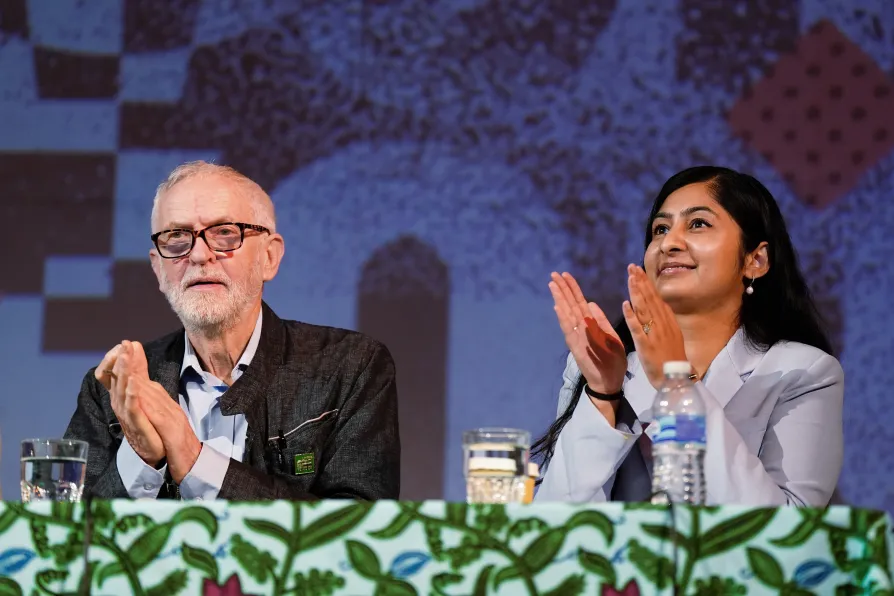
 Jeremy Corbyn and Zarah Sultana take part in a discussion on Your Party, their new political party, at The World Transformed conference, at Niamos Radical Arts Centre in Hulme, Manchester, October 10, 2025
Jeremy Corbyn and Zarah Sultana take part in a discussion on Your Party, their new political party, at The World Transformed conference, at Niamos Radical Arts Centre in Hulme, Manchester, October 10, 2025
ON FRIDAY, Iqbal Mohamed became the second “Gaza independent” to announce his departure from Your Party.
At the weekend, Green Party leader Zack Polanski suggested another of Your Party’s MPs, Zarah Sultana, would be welcome in the Greens.
Polanski wouldn’t float the idea if it weren’t common knowledge that relations between the founders of the new left party are frayed to say the least. Why put up with the infighting? A party left of Labour is already taking off.
And it is. The Greens have more than doubled in membership since Polanski won the leadership — a surge proportionally comparable to Labour’s under Jeremy Corbyn, if much smaller in absolute terms. They are polling higher than ever in their history — while the collapse of support for Britain’s “big two” offers the prospect of electoral earthquakes.
Nor can they be dismissed as a single-issue party. Their conference headlined on class confrontation, with its vote to abolish private landlords, and Polanski focuses on inequality and redistributing wealth. The pledge to declare the Israel Defence Forces a terrorist organisation contrasts the British state’s alliance with a regime committing genocide with its decision to label peaceful protesters “terrorists.”
And if their origins do lie in a single issue, what an issue it is. The climate crisis is existential. It affects the cost of food and the security of our homes. It drives geopolitical conflict and creates refugees.
It is here, however, that the very scale of the crisis demands a politics of rupture with the British state more radical than anything yet offered by the Greens.
The just-ended Cop30 summit adopted no targets for reduction of fossil fuel use. The United States did not send a delegation. At a recent summit in Abu Dhabi, the US stated openly there would be no energy transition: the energy needs of emergent AI would increase fossil fuel demand even with renewables alongside.
The US’s great rival, China, is the main mover in green tech. It dominates renewable energy production and supply chains. As it helps build solar farms across Asia and electric vehicle plants in the Sahel, alignment with the US-led cold war against it risks derailing any transition in Europe.
Climate politics is now part of the conflict between US-led imperialism and a rising global South. We cannot address it without confronting Britain’s place in the imperialist camp — which includes a European Union that prostrates itself before Donald Trump — and opposing rearmament and the drive to war, on which the Greens remain ambivalent.
There is no mass anti-imperialist party in Britain. But there could be.
Your Party’s unique potential — which saw its initial announcement attract 800,000 sign-ups — rests on two things.
One is Corbyn himself. Having led Labour as a mass party of 600,000 for five years gives him a profile no leader of previous left-of-Labour outfits could dream of, and a huge reservoir of admiration and respect across the left. Labour is itself much weaker, socially and politically, than when challenged by Respect or the Socialist Labour Party.
But the other is its origins in the greatest mass mobilisation this country has seen in decades: the Palestine solidarity movement.
The Gaza genocide, and Britain’s complicity in it, have opened eyes to the savagery of the British state and the real — aggressive and oppressive, not defensive or democratic — character of its alliances.
That movement saw more independents elected on a left of Labour ticket than ever before.
The “Gaza independents” are a vital part of the coalition needed to build a new left party that puts anti-imperialism at its heart: losing any MP is a big setback, and sectarian posturing online cannot mask that.
If the left cannot remember that movements are built on what people have in common rather than what divides them, this will be another in a long line of wasted opportunities.










